.
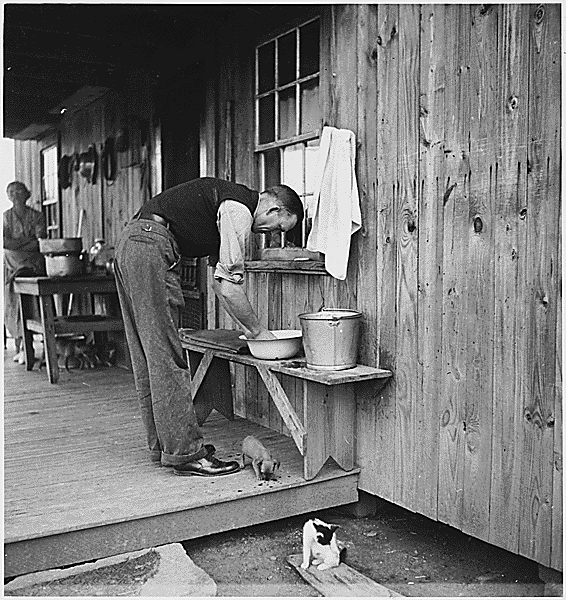
Man washing hands in bowl, woman in background, n.d.
In a ruined world, still the ritual ablutions
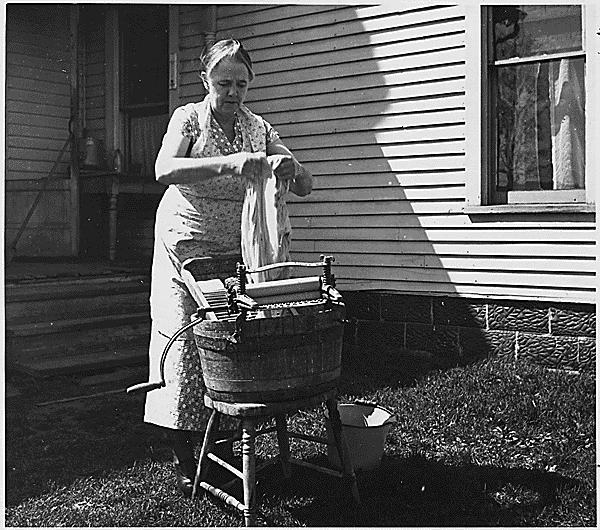
Woman plunges and scrubs, n.d.
Through the wringer
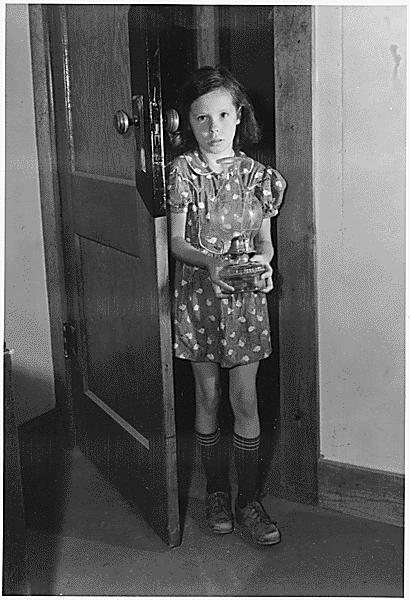
Girl in doorway holding unlit lamp, n.d. (Resettlement Administration)
Night must fall

Federal/state old-age assistance provides for those who are now old and needy, 1935 (Farm Security Administration/Works Progress Administration)
Been here since before you were born, sonny
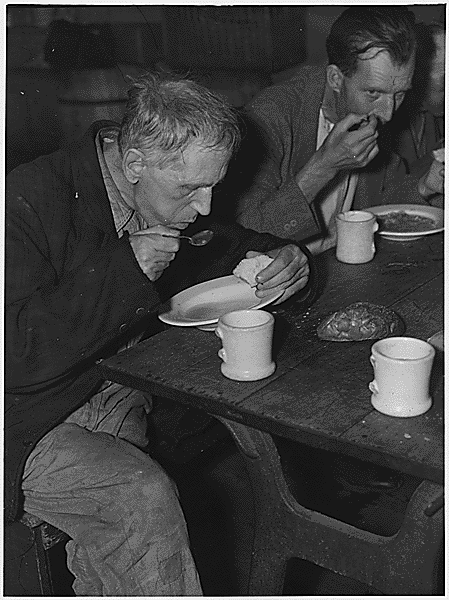
Unemployed men eating in Volunteers of America soup kitchen, Washington, D.C. June 1935 (Farm Security Administration/Works Progress Administration)
Nothing left over
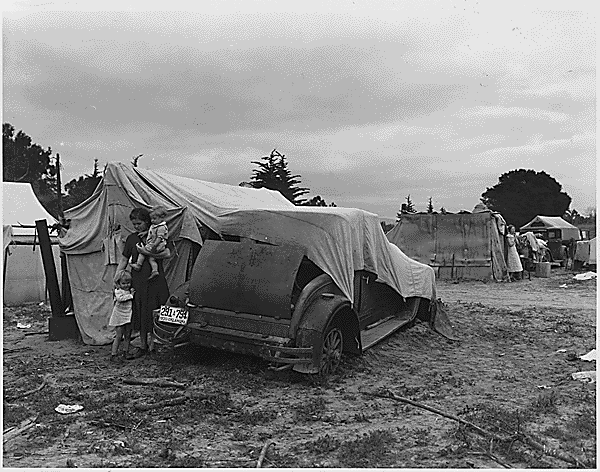
Migrant family looking for work in the pea fields of California, 1935
Dust to dust, mud to mud
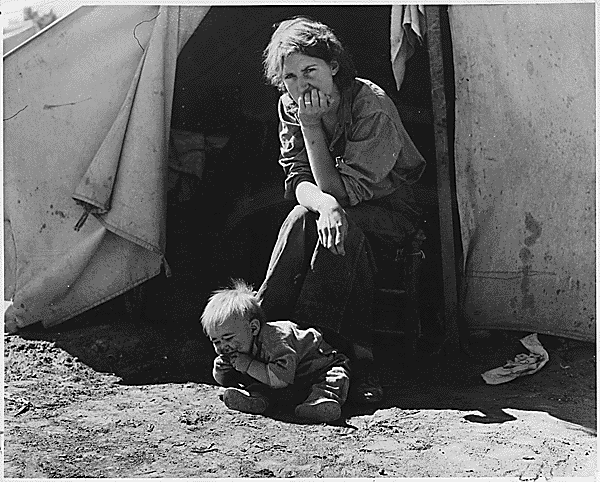
Eighteen-year-old mother from Oklahoma now a California migrant, March 1937
Tomorrow looks a lot like yesterday
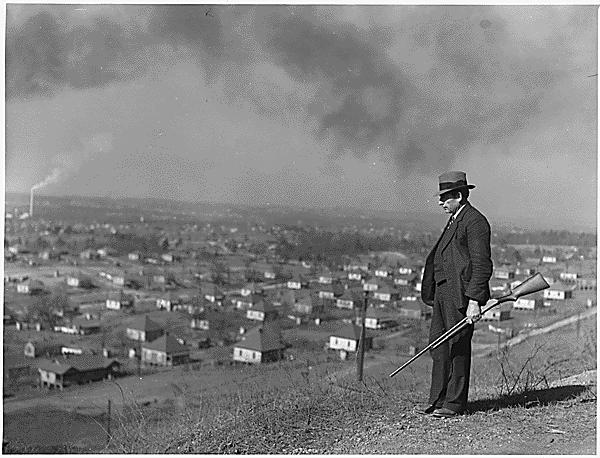
Guard at company town, Jefferson County, Alabama, February 1937 (Farm Security Administration)
Discourage trouble before it starts
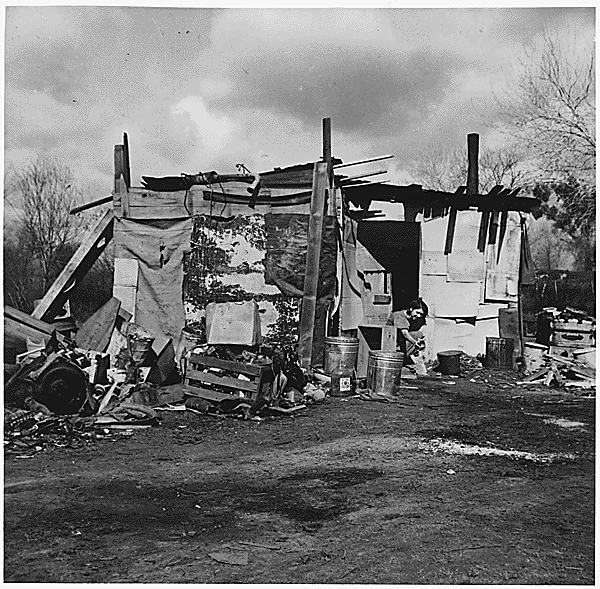
Arkansas squatter for three years in California, near Bakersfield, California, 1935: photo by D. Lange (Farm Security Administration)
A ramshackle version of works progress
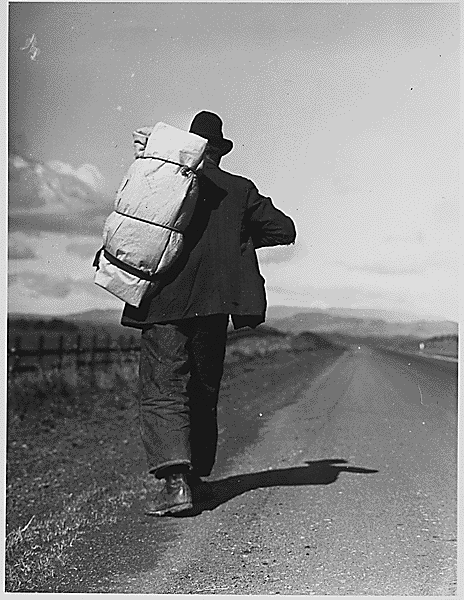
Migrant worker on California highway, 1935 (Farm Security Administration)
Seventeen miles to go before sundown
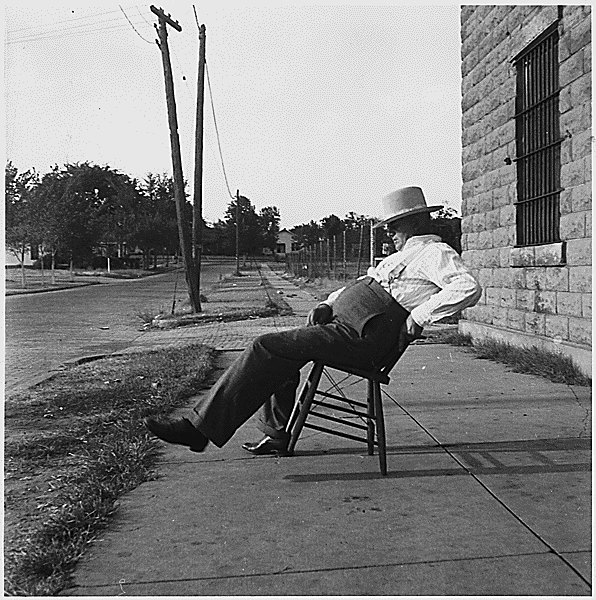
Chief of police in Oklahoma town, 1935 (Farm Security Administration)
A precarious stability
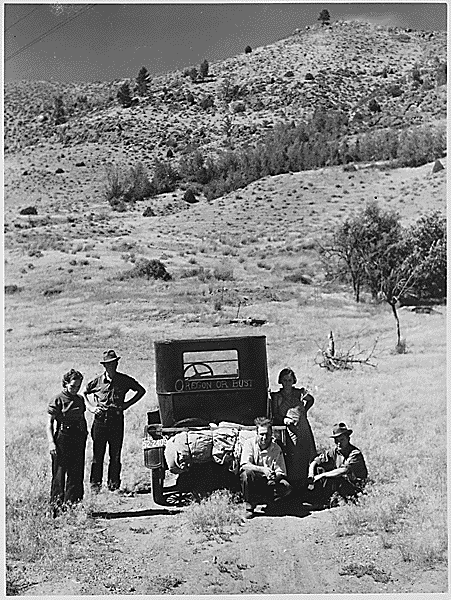
Vernon Evans family leaving South Dakota drought area for the West, 1935 (Farm Security Administration/Resettlement Administration)
Oregon or Bust
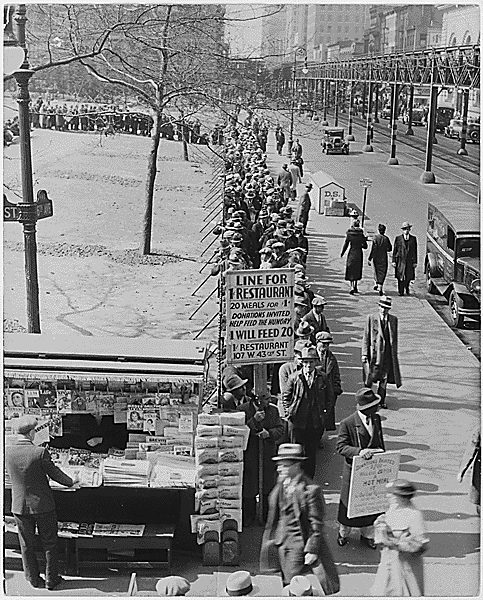
Depression: Bread lines: long line of people waiting to be fed, New York City, February 1932
A dollar will feed twenty hungry mouths
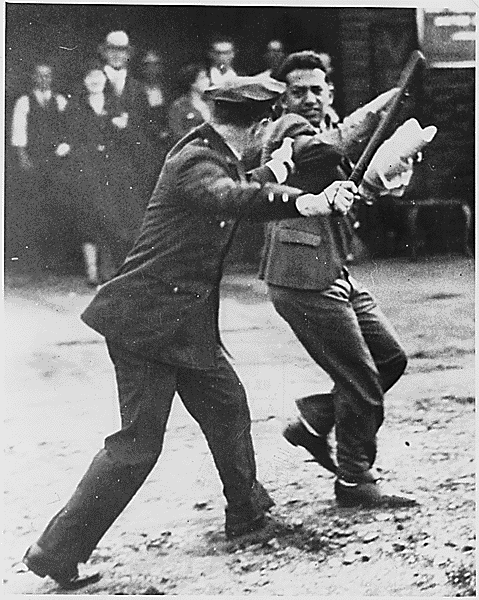
Labor strikes, San Francisco: police and strikers battle, 1934
A disagreement in principle
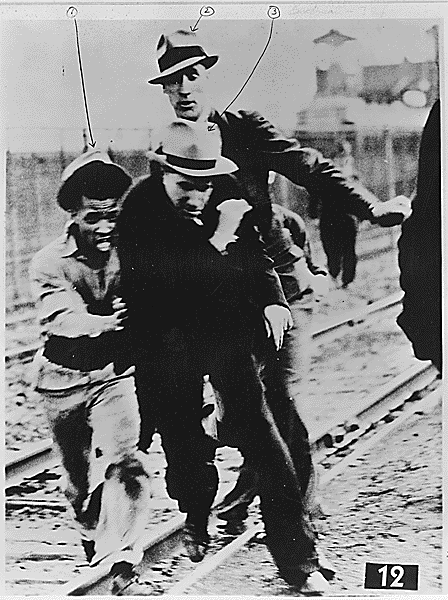
Labor strike, Ford Motor Company: men in physical altercation, May 26, 1937
Don't let him get away
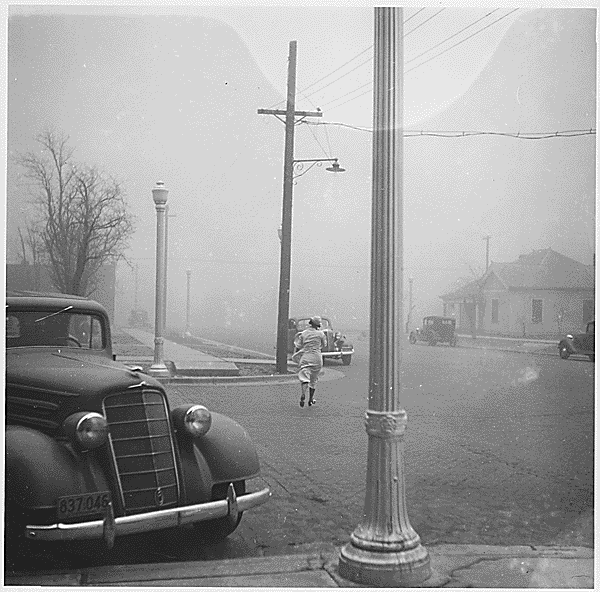
Dust storm in Amarillo, Texas, 1936: photo by Arnold Rothstein (Farm Security Administration)
It blinds you and penetrates your skin
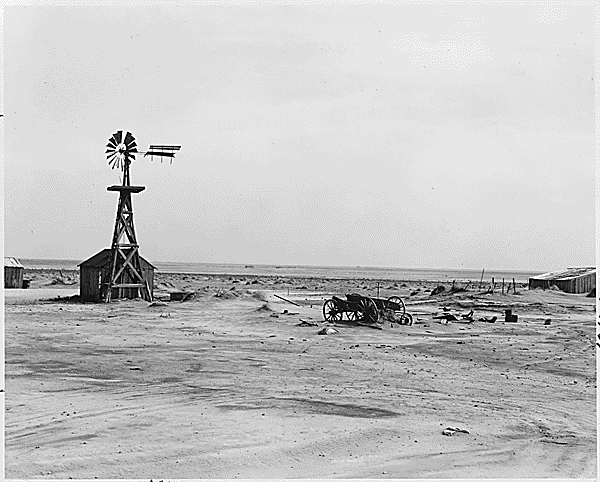
Soil erosion, 1935
All quiet now but for the prairie wind
Photographs from the Franklin D. Roosevelt Presidential Library
The starkness, the beauty, the sadness ... overwhelming.
ReplyDeleteThese are indeed overwhelming, individually and collectively. I'm grateful for the way you've curated these images and captioned them with poetry. As I've mentioned, American history is taught differently to young people these days and a lot seems to be missing from the curriculum. I can share these with Jane, who hears Caroline and me discussing these events at home, but hasn't been really exposed to them otherwise and hasn't seen the images showing context. Among this series, which is so powerful, I think the picture that haunts me the most is the guard at the company town, dressed (as would be the fashion at the time, I guess) in a business suit. I'm in Manhattan today, where I've seen very few business suits, and everyone is blending into into everyone else.
ReplyDeleteGorgeous,raw,unflinching. Thank you.
ReplyDeleteDon, Curtis, Alicia,
ReplyDeleteThank you for being here. Yes, I felt all these same things, the starkness, the beauty, the sadness, the rawness, the overwhelming sense of the human meaning of history, of all that has been lived through, of all that has been done and all that remains undone or must be done over, if we are to go on.
Unflinching is another apt word, as I do remember from the world of my childhood the willingness of people who had managed to make it through the Depression years to just "get on with it". No turning aside or away even possible.
Myself, I would like to feel that strength but do not. I flinch. The failing social system in which we live has rolled over us here, and I do feel overwhelmed, powerless and without voice.
But these pictures do speak not only for themselves but perhaps for something abiding in all of us, if we would let them.
When I look closely I see the same inequities and imbalances, the same cruelties and the same coldnesses we have around us now.
But in that close look I also see courage, and that is what inspires. The busy American poetry ratrace, that institutionalized bubble of nothing, in my admittedly tiny limited view, is going to be of absolutely no use in shoring up our spirit against the losses suffered and the losses to come. I think we are simply going to have to find that something in ourselves.
The past is about the only place where I can look right now without having to shield my eyes and stop my ears.
And yes, Curtis, that man in the business suit is surely there to take care of business; as we all know the business has always gotten done, if no easier way presented itself, out of the business end of a gun.
think of all those
ReplyDeletewho left the dust bowl
in the 30's for whom
California became the
promissed land less
than 20 years later
with a World War
in between
California is on the
verge of bankruptcy
too much giveaway
and no accountability
and a myriad of explanations
there's only one way out of
debt...pay it off
in other words hard work
for less...and pay the bills
one after one
do you think Walmart thought
of that when they buy in
China?
the best laid plans may
lead to surfdom...and the
horrors of an unplanned
economy to less than the
aesthetic
Tom, again, thank you for these photos and your words that accompany them, as well as what you've said in the comments. I haven't been able to get this post of yours out of my mind since I first saw it yesterday. Unlike the Vernon Evans family, mine did not have to leave South Dakota. Somehow they managed to hold on to the family farm and to put food on the table for their growing brood. They didn't talk much about those bad times. Rarely I heard bits and pieces about the "Dirty Thirties" -- the unrelenting and blinding dust storms and swarms of grasshoppers. These were people who lived by a certain code, one of dignity and raw courage.
ReplyDeletebeautiful...thanks!!
ReplyDeleteTom,
ReplyDeleteAmazing pictures with yes, beautiful captions -- stark, uninflected, fact of things as they were (and are, that's what's so moving about this) -- a little bit of Johnny's education has just begun (he too liked the man w/ gun taking care of business in that Alabama company town best). . . .
8.12
light coming into fog against invisible
ridge, blue jays calling back and forth
in foreground, wave sounding in channel
everything that is therefore
beginning, what is said
to be in a painting, or will
move, figures happening
grey-white of fog reflected in channel,
circular green pine on tip of sandspit
There are reasons the courage you speak of is gone. Why?
ReplyDeleteI think it's what Lyotard was trying to get at with his end of metanarratives thing. I read that to mean the end of utopian (i.e. hopeful) matanarratives. TJ Clark calls the L's postmodern in fact the triumph of modernity.
Without trying to leave for a moment what you call, rightly, "he starkness, the beauty, the sadness, the rawness, the overwhelming sense of the human meaning of history, of all that has been lived through, of all that has been done and all that remains undone", it's not individual grit that's lacking these days.
Triumphant modernity's a monster, worse than Kronos devouring his young (see the Vik Muniz play on Goya I posted last night ...)
I hear you when you say "The failing social system in which we live has rolled over us here, and I do feel overwhelmed, powerless and without voice."
Something real is crushing us.
(Which is one reason I love to read Stephen's poems ...)
Thanks everyone.
ReplyDeleteMarcia, I understand what you are saying. This also encompasses the subject of hard work.
My grandparents were driven on by the demands of hungry growing broods from Ireland. My mother's father from Country Kerry to South Dakota to Chicago, where he lit streetlamps and drove trolleys, my mother's mother from County Westmeath to New York to clean the homes of those better off, and thence on to...
and so on.
"These were people who lived by a certain code, one of dignity and raw courage."
Amen. The code is dead, replaced by a text message.
proud family heirloom
ReplyDeletegrandpa knew Samuel Gompers
but instead of continuing
in New York City politics
took a milk route
in Dover New Jersey
up on Mt.Fern outside
of town he eventually
set up his own business
Mt. Fern Dairy
the 1930's depression
just didn't hit the midwest.
25% of the population was
out of work so the trek
to California was
also made from New Jersey
there were several families
with children who couldn't
afford milk but grandpa
delivered milk anyway
saying the kids needed it
twenty years later in the 50's
he got letters from California
from people paying their bills
from twenty years earlier
the cynical can get rancidly
depressed
nevertheless
the big heart
still circles
How long can/will we continue to be the land of broken promises? Recent thought of how we continue to adapt, transform and become some mutant version of who we believed ourselves to be. Your ability to gather the images, remind us that perhaps it is sheer resilience that holds us together over such a long decline.
ReplyDeleteMarylinn,
ReplyDeleteI hate to say it, and I don't mean to sound or seem or be cynical, but I'm afraid I think the promise is broken forever.
Thanks very much, by the way, for noticing the fact that the images had to be selected and gathered. In the past two months I have examined about 2,500 individual image files from the 1930s and 1940s. To be honest it has been killing labour, and when you're not making a living and the life urgencies are building up, it has all the appearances of useless dawdling, this intensive preoccupation with old photos.
With time I have begun to dimly understand why I am doing it. I am looking for something, something that is lost. I know that I am not going to find that something. But the looking for it helps me to remember it.
Even more satisfying is the sense, which I get from some who visit here, that I am not alone in this search, and that therefore, just possibly, the time is not being entirely wasted. Thanks very much for giving me that sense.
I get the feeling when I am at your blog that we are searching at the same time. And that neither of us is quite sure what the object is. And that maybe that's okay.
The mutant form of ourselves which we would become if we shed the husk of who we were -- that is interesting to consider.
(I almost said "terrifying".)
the America
ReplyDeleteyou are searching for
still exists
if you go door to door
and more
especially perhaps
in out of the way
places
here's an example
but also fading
when I first came
to where I live now
I worked for a doctor
who believed that the
physicians of the county
had a moral obligation
to deliver the indigent
women of the county(this
was before Medicaid paid
for obstetrics)...every once
in awhile a letter would show
up in the local paper appreciating
this doctor as being "God called"
Now of course he would be called
crazy and pay malpractice insurance
up the wazoo
same doctor got me into medical
school and the money to go on
a handshake deal
I know poets generally feel things
before the rest of the people
and the disintegration of society
as we know it and have known it
is certainly a real possibility
when money gets funny things get
weird and then between corruption
and the entitlement mentality America is
possibly doomed and that doesn't
exclude determined external enemies
on the commentary side,re dust
storms: these took a terrible toll
on the respiratory system particularly the young and asthmatic the old the smokers
and numerous deaths occurred
Elmo,
ReplyDeleteIn known/knowable communities -- communities in which people know the lay of the land upon which they exist -- it seems people are a lot more likely to feel compassion and offer help to one another. This is probably historically correct. I think the farther one gets away from large urban areas, the more likely it is that this will still be the case.
Tom, Far from useless dawdling, the examination and selection of the photos is filled with purpose. I believe that our energies, selflessly applied, reach a much wider circle than those who come to read and comment and exchange. With scientific knowledge that is sketchy at best, I know that the waves, the ripples carry for nearly immeasurable distances. We do the things we do because we must.
ReplyDeleteI am searching; after your comment, I wondered how I would define my goal. The word reconciliation came to me - a way of somehow bringing what we know to be the truth of the past and fusing it to the present, where truth seems to be unbearable to so many. Why I continue to hope that somehow the pieces will fit together when they scarcely do that in my own life, I am not quite certain. I just know that it is important, as it is for you to keep presenting, illuminating, these glimpses of who we still are; keeping us aware that what we can't escape is us.
Yes, Marylinn, that's true.
ReplyDeleteHere these days it's a matter of day-by-day picking up the pieces, with complications of problems beyond solution, the pieces scattered everywhere.
One way of trying to maintain a precarious stability might be our attempting to gather these bits of the past, like small shards of glass, and turning them round in the light until we think we see something. I'd prefer they were transparent, but I suppose the truth is, as you suggest, the image of which we catch a glimpse, when the light is right for a moment, is simply ourselves reflected. In our ancestors and also in our own imagination of ourselves, shadowed by our sense of the brevity of all this.
Some of us have a bit better shine to us than others, it might be, though. (At your place the light must be pretty good, I can usually feel a glow.)